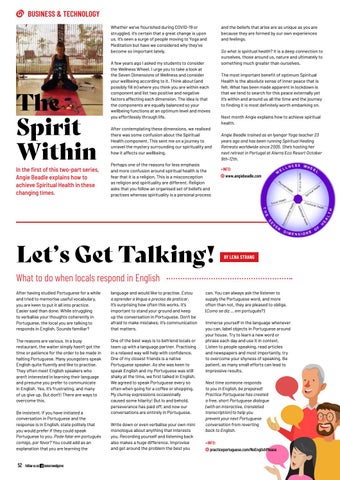BUSINESS & TECHNOLOGY Whether we’ve flourished during COVID-19 or struggled, it’s certain that a great change is upon us. It’s seen a surge of people moving to Yoga and Meditation but have we considered why they’ve become so important lately.
The Spirit Within
In the first of this two-part series, Angie Beadle explains how to achieve Spiritual Health in these changing times.
A few years ago I asked my students to consider the Wellness Wheel. I urge you to take a look at the Seven Dimensions of Wellness and consider your wellbeing according to it. Think about (and possibly fill in) where you think you are within each component and list two positive and negative factors affecting each dimension. The idea is that the components are equally balanced so your wellbeing functions at an optimum level and moves you effortlessly through life. After contemplating these dimensions, we realised there was some confusion about the Spiritual Health component. This sent me on a journey to unravel the mystery surrounding our spirituality and how it affects our wellbeing. Perhaps one of the reasons for less emphasis and more confusion around spiritual health is the fear that it is a religion. This is a misconception as religion and spirituality are different. Religion asks that you follow an organised set of beliefs and practises whereas spirituality is a personal process
Let’s Get Talking!
and the beliefs that arise are as unique as you are because they are formed by our own experiences and feelings. So what is spiritual health? It is a deep connection to ourselves, those around us, nature and ultimately to something much greater than ourselves. The most important benefit of optimum Spiritual Health is the absolute sense of inner peace that is felt. What has been made apparent in lockdown is that we tend to search for this peace externally yet it’s within and around us all the time and the journey to finding it is most definitely worth embarking on. Next month Angie explains how to achieve spiritual health. Angie Beadle trained as an Iyengar Yoga teacher 23 years ago and has been running Spiritual Healing Retreats worldwide since 2005. She’s hosting her next retreat in Portugal at Aterra Eco Resort October 9th-12th. +INFO: www.angiebeadle.com
BY LENA STRANG
What to do when locals respond in English After having studied Portuguese for a while and tried to memorise useful vocabulary, you are keen to put it all into practice. Easier said than done. While struggling to verbalise your thoughts coherently in Portuguese, the local you are talking to responds in English. Sounds familiar?
language and would like to practise. Estou a aprender a língua e preciso de praticar. It’s surprising how often this works. It's important to stand your ground and keep up the conversation in Portuguese. Don’t be afraid to make mistakes; it's communication that matters.
The reasons are various. In a busy restaurant, the waiter simply hasn't got the time or patience for the order to be made in halting Portuguese. Many youngsters speak English quite fluently and like to practise. They often meet English speakers who aren't interested in learning their language and presume you prefer to communicate in English. Yes, it's frustrating, and many of us give up. But don't! There are ways to overcome this.
One of the best ways is to befriend locals or team up with a language partner. Practising in a relaxed way will help with confidence. One of my closest friends is a native Portuguese speaker. As she was keen to speak English and my Portuguese was still shaky at the time, we first talked in English. We agreed to speak Portuguese every so often when going for a coffee or shopping. My clumsy expressions occasionally caused some hilarity! But lo and behold, perseverance has paid off, and now our conversations are entirely in Portuguese.
Be insistent. If you have initiated a conversation in Portuguese and the response is in English, state politely that you would prefer if they could speak Portuguese to you. Pode falar em português comigo, por favor? You could add as an explanation that you are learning the
52
Follow us on tomorrowalgarve
Write down or even verbalise your own mini monologue about anything that interests you. Recording yourself and listening back also makes a huge difference. Improvise and get around the problem the best you
can. You can always ask the listener to supply the Portuguese word, and more often than not, they are pleased to oblige. (Como se diz … em português?) Immerse yourself in the language whenever you can, label objects in Portuguese around your house. Try to learn a new word or phrase each day and use it in context. Listen to people speaking, read articles and newspapers and most importantly, try to overcome your shyness of speaking. Be patient, as many small efforts can lead to impressive results. Next time someone responds to you in English, be prepared! Practice Portuguese has created a free, short Portuguese dialogue (with an interactive, translated transcription) to help you prevent your next Portuguese conversation from reverting back to English. +INFO: practiceportuguese.com/NoEnglishPlease







